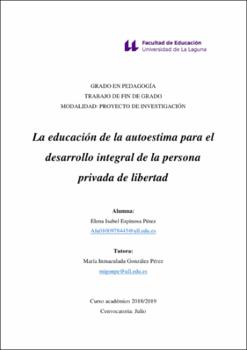La educación de la autoestima para el desarrollo integral de la persona privada de libertad
Author
Espinosa Pérez, Elena IsabelDate
2019Abstract
El presente TFG recoge un proyecto de investigación sobre la relación existente entre la
autoestima como elemento de desarrollo integral de la persona de cara a los procesos de
reeducación, rehabilitación y reinserción de las personas privadas de libertad. Para ello se
hace una revisión de cómo los marcos jurídicos españoles garantizan el desarrollo integral de
la persona como un derecho de las población reclusa, además se definen los procesos de
reeducación, rehabilitación y reinserción así como un esclarecimiento sobre como interfiere
la autoestima en el desarrollo integral de la persona y los procesos anteriormente
mencionados. Para realizar la investigación se le aplicó la Escala de Autoestima de
Rosenberg a una muestra de los internos de la Institución Penitenciaria de Tenerife, así como
un cuestionario al cuerpo docente del Centro y, al mismo tiempo se realizó una entrevista a
uno de los psicólogos y otra a un docente. Lo que se observa finalmente es que la autoestima
de los internos no está del todo clara; la autoestima como elemento para abordar el desarrollo
integral debería ser un eje fundamental dentro de la Institución, y además, la Institución
Penitenciara de Tenerife no le da importancia a la autoestima de los internos. This TFG contains a research project on the relationship between self-esteem as an element
of integral development of the person for the processes of re-education, rehabilitation and
reintegration of persons deprived of liberty. To this end, a review is made of how the Spanish
legal frameworks guarantee the integral development of the person as a right of the inmate
population, in addition the processes of re-education, rehabilitation and reintegration are
defined as well as an clarification on self-esteem in the integral development of the person
and the above processes. To carry out the research, the Rosenberg Self-Esteem Scale was
applied to a sample of the inmates of the Tenerife Penitentiary Institution, as well as a
questionnaire to the faculty of the Centre and, at the same time, an interview was conducted
with one of the psychologists and another to a teacher. What is finally observed is that the
self-esteem of the inmates is not entirely clear; self-esteem as an element in addressing integral development should be a fundamental axis within the Institution, and in addition, the
Tenerife Penitentiary Institution does not attach importance to the self-esteem of inmates.





